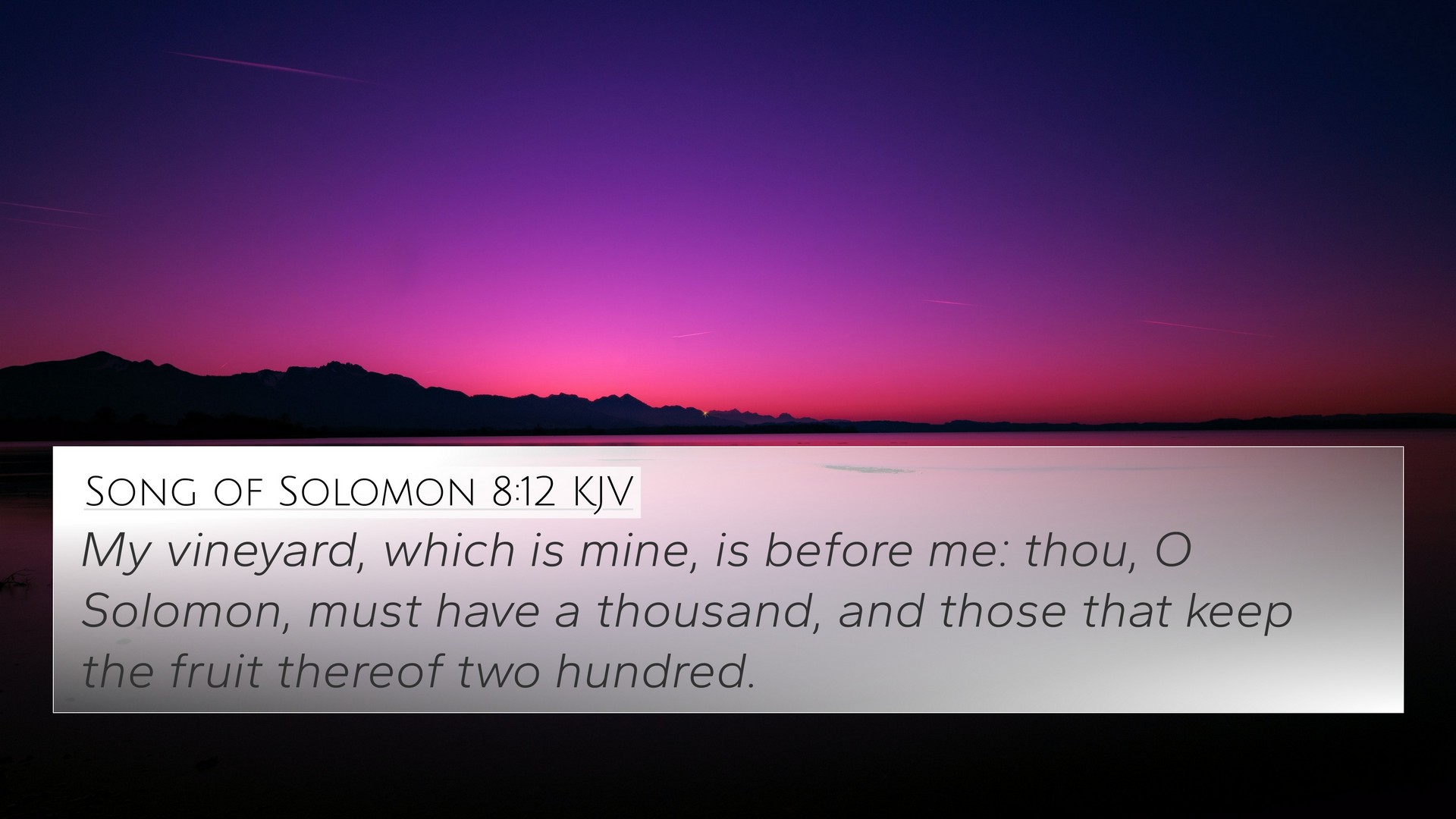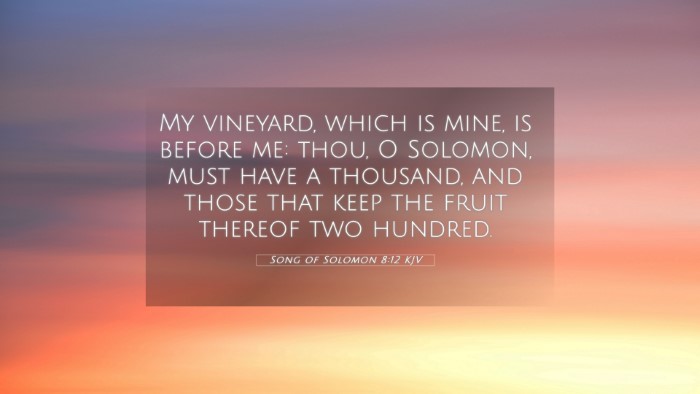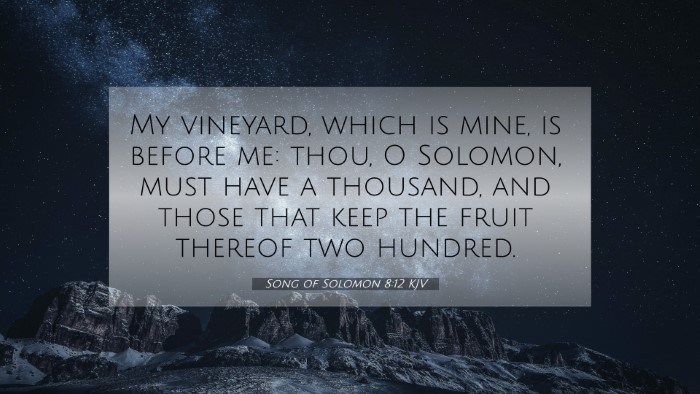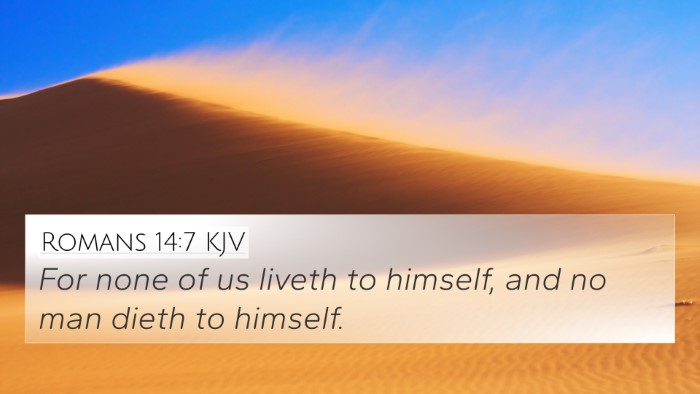Old Testament
Genesis Exodus Leviticus Numbers Deuteronomy Joshua Judges Ruth 1 Samuel 2 Samuel 1 Kings 2 Kings 1 Chronicles 2 Chronicles Ezra Nehemiah Esther Job Psalms Proverbs Ecclesiastes Song of Solomon Isaiah Jeremiah Lamentations Ezekiel Daniel Hosea Joel Amos Obadiah Jonah Micah Nahum Habakkuk Zephaniah Haggai Zechariah MalachiSong of Solomon 8:12 Similar Verses
Song of Solomon 8:12 Cross References
My vineyard, which is mine, is before me: thou, O Solomon, must have a thousand, and those that keep the fruit thereof two hundred.
Uncover the Rich Themes and Topics of This Bible Verse
Listed below are the Bible themes associated with Song of Solomon 8:12. We invite you to explore each theme to gain deeper insights into the Scriptures.
Song of Solomon 8:12 Cross Reference Verses
This section features a detailed cross-reference designed to enrich your understanding of the Scriptures. Below, you will find carefully selected verses that echo the themes and teachings related to Song of Solomon 8:12 KJV. Click on any image to explore detailed analyses of related Bible verses and uncover deeper theological insights.
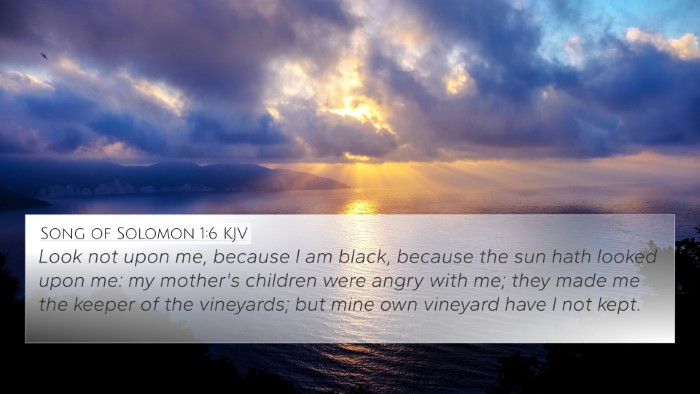
Song of Solomon 1:6 (KJV) »
Look not upon me, because I am black, because the sun hath looked upon me: my mother's children were angry with me; they made me the keeper of the vineyards; but mine own vineyard have I not kept.
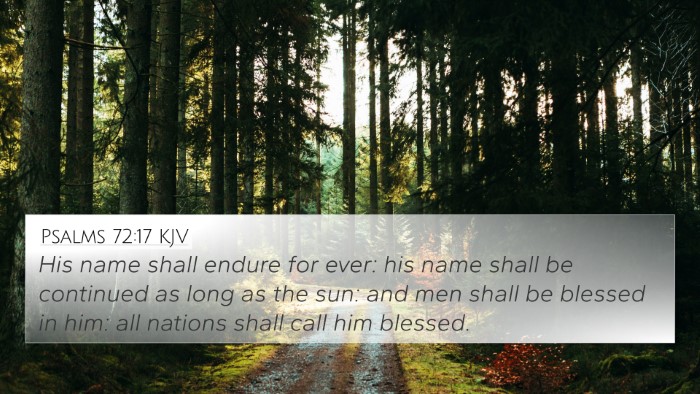
Psalms 72:17 (KJV) »
His name shall endure for ever: his name shall be continued as long as the sun: and men shall be blessed in him: all nations shall call him blessed.
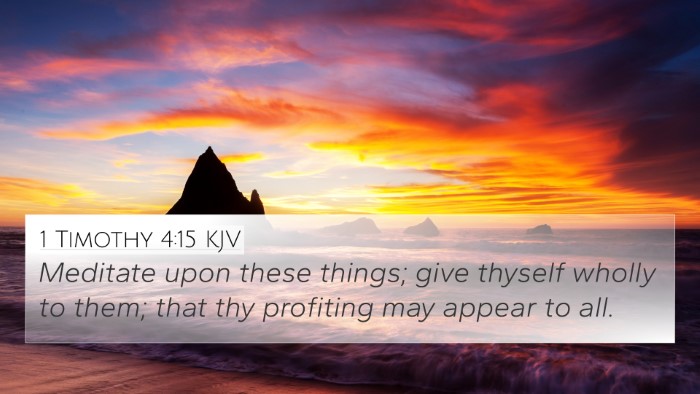
1 Timothy 4:15 (KJV) »
Meditate upon these things; give thyself wholly to them; that thy profiting may appear to all.
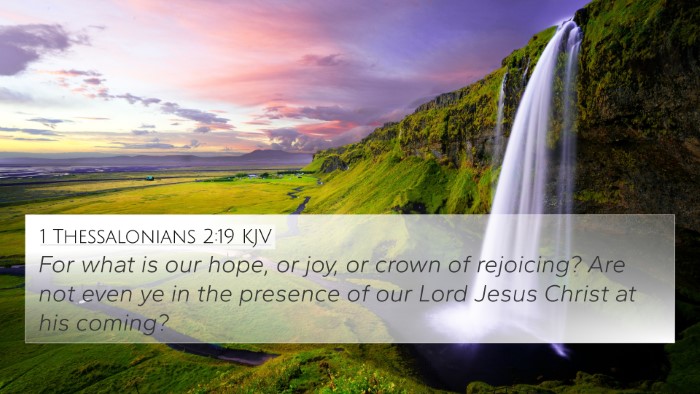
1 Thessalonians 2:19 (KJV) »
For what is our hope, or joy, or crown of rejoicing? Are not even ye in the presence of our Lord Jesus Christ at his coming?
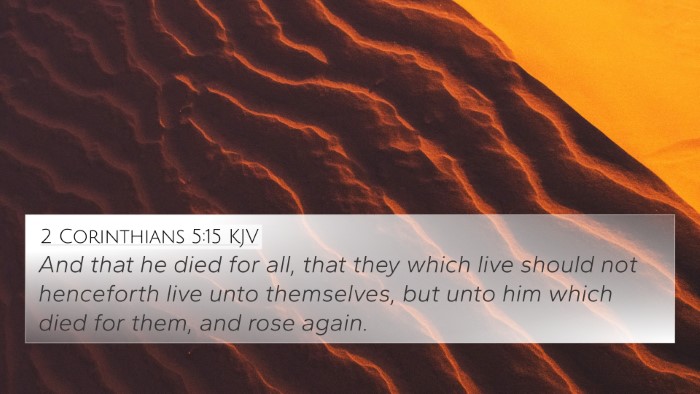
2 Corinthians 5:15 (KJV) »
And that he died for all, that they which live should not henceforth live unto themselves, but unto him which died for them, and rose again.
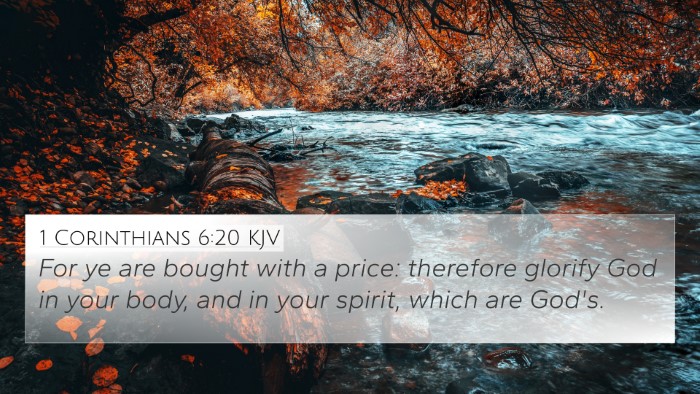
1 Corinthians 6:20 (KJV) »
For ye are bought with a price: therefore glorify God in your body, and in your spirit, which are God's.
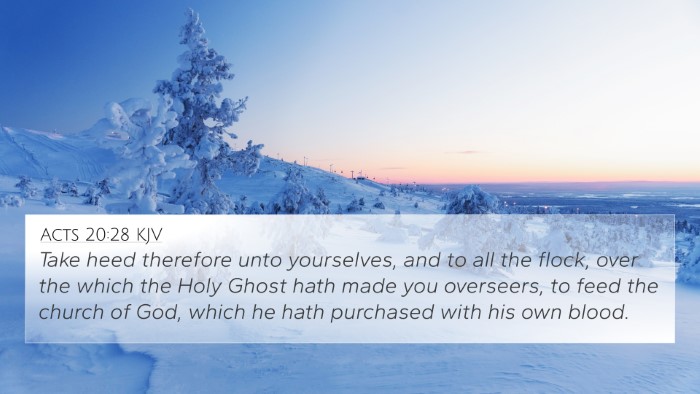
Acts 20:28 (KJV) »
Take heed therefore unto yourselves, and to all the flock, over the which the Holy Ghost hath made you overseers, to feed the church of God, which he hath purchased with his own blood.
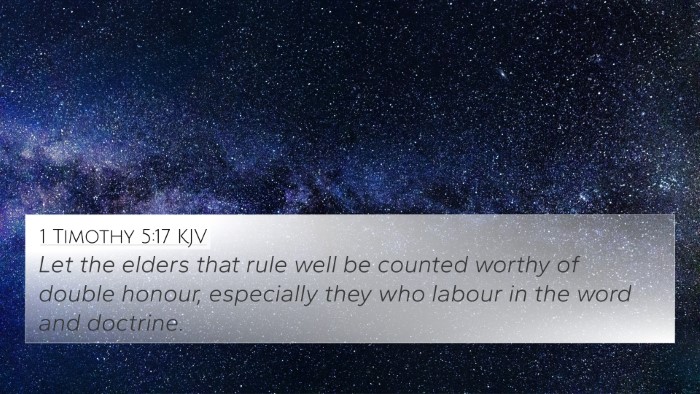
1 Timothy 5:17 (KJV) »
Let the elders that rule well be counted worthy of double honour, especially they who labour in the word and doctrine.
Song of Solomon 8:12 Verse Analysis and Similar Verses
Understanding Song of Solomon 8:12
Verse: "My vineyard, which is mine, is before me: thou, O Solomon, must have a thousand, and those that keep the fruit thereof two hundred." (Song of Solomon 8:12, KJV)
Verse Meaning and Interpretation
This verse from the Song of Solomon highlights themes of love, possession, and duty within a relationship. The speaker emphasizes the value of their vineyard, a symbol of love and intimacy, delineating clear ownership and responsibility.
Commentary Insights
- Matthew Henry: Henry discusses the importance of personal possession in love. The vineyard represents the beloved's heart, which is cherished and safeguarded. The mention of Solomon underscores wealth and the expectation around love’s rewarding nature.
- Albert Barnes: Barnes notes that this verse illustrates the dual nature of love—both intimate and communal. While private affection is treasured, it is also recognized within a larger social framework, reflecting the complexities of relationships in society.
- Adam Clarke: Clarke interprets the vineyard as a metaphor for one's own spiritual and emotional investments. The figures highlighted suggest a contrast in the expectations of love: while one holds fast to their portion, broader expectations may arise rooted in traditional norms of wealth and stewardship.
Thematic Connections to Other Bible Verses
Song of Solomon 8:12 can be linked to various other scriptures, establishing a deeper understanding of its themes:
- Proverbs 5:15-17: "Drink waters out of thine own cistern, and running waters out of thine own well." - A call to cherish and be faithful to one's own love, paralleling the personal ownership in Song of Solomon 8:12.
- Matthew 25:14-30: The Parable of the Talents illustrates stewardship and responsibility over what is entrusted to us, akin to tending to one's vineyard.
- 1 Corinthians 13:4-7: This passage on love complements the enduring themes in the Song of Solomon, where love is illustrated as selfless and protective.
- John 15:1-5: Jesus speaks of Himself as the vine, linking the theme of maintaining relationships with the nurturing of fruit—the very essence of love and belonging.
- Genesis 2:24: Illustrates the union between partners, which can mirror the sense of commitment expressed in Song of Solomon 8:12.
- Song of Solomon 1:6: Reflects on the past feelings of neglect, enhancing the context of nurturing what one possesses.
- Philippians 4:19: Can serve as a reminder of God's provision, paralleling the care taken to safeguard one’s possessions.
- James 1:17: Highlights the idea that every good gift comes from above, reminding us to value what we possess, much like the speaker’s reverence for their vineyard.
- Hebrews 13:4: Emphasizes the sanctity of marriage and love, relevant to the context of the intimate relationship depicted in Song of Solomon.
- Romans 12:10: Calls for brotherly love and honor in relationships, aligning with the affectionate tone present throughout the Song of Solomon.
Cross-referencing Biblical Texts
The thematic exploration of Song of Solomon 8:12 aligns with several critical endeavors aimed at linking biblical scriptures:
- Tools for Bible Cross-Referencing: Utilizing resources that help in finding scripture relations can deepen understanding of love in the Bible.
- Bible Concordance: A vital tool for looking closely at keywords such as "vineyard" and "love," enabling exploration of related verses.
- Bible Cross-Reference Guide: This guide can equip readers with insights into thematic connections, enhancing the study of intimate relationships in the Bible.
- Human Behavioral Insights: Inter-Biblical dialogue reveals the same themes resonate through both Old and New Testament teachings, calling for a reflection on how love is construed throughout.
- Cross-Reference Bible Study: Encourages reflective exploration of how various verses articulate similar sentiments about love and stewardship.
Application in Study and Reflection
When studying Song of Solomon 8:12, it is crucial to recognize how personal and broader societal values intertwine in biblical love narratives. Engaging with tools for cross-referencing provides deeper insights into these divine principles:
- How to Use Bible Cross-References: Readers can create parallels among various scriptural verses, enriching their understanding of relational dynamics.
- Bible Chain References: This method can guide readers toward discovering connections between the themes of ownership and love across Scripture.
- Comprehensive Bible Cross-Reference Materials: Engaging with these materials can provide a well-rounded perspective on love in different biblical contexts.
Conclusion
Song of Solomon 8:12 stands as an intricate expression of love, responsibility, and personal ownership within relationships. Through the lens of public domain commentaries and with a focus on cross-referencing biblical texts, one can appreciate the richness and depth of love portrayed in Scripture. Leveraging thematic connections enhances the understanding of this verse and invites further exploration into the diversity of love as depicted across the Bible.
Further Study Suggestions
- Engage in comparative studies of Old and New Testament teachings on love.
- Explore the backdrop of cultural expectations during the time the Song was written.
- Analyze how the themes of stewardship and intimacy are portrayed across different parables and lessons in the Bible.
